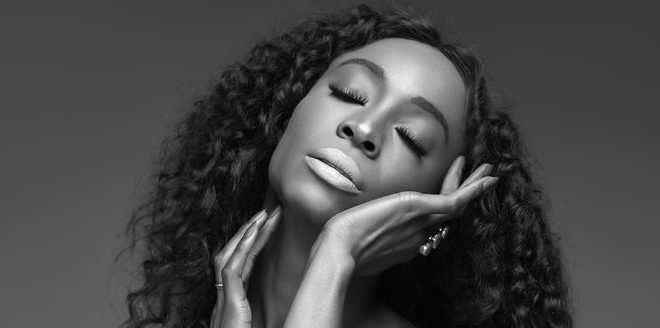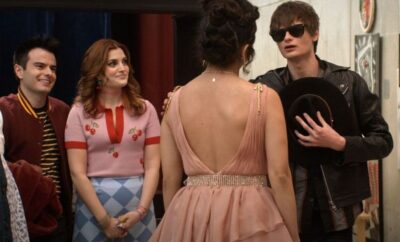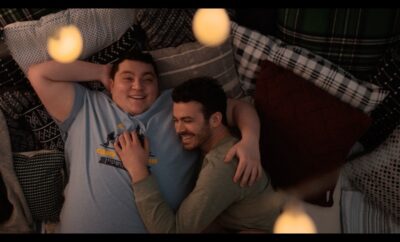 James Anthony
James Anthony
Interviews
Angelica Ross – Pose
By: Jamie Steinberg
Q) Candy doesn’t suffer fools or mix words. What is the root of her attitude?
A) The root of her attitude is from a trans African proverb that goes, “It is what it is.” Or, as Marsha P. Johnson would say, “Pay it or pay it no mind.” And it’s one of these things where when you are forced to face reality and you’re forced to not lie to yourself in be in situations where it is what it is, it comes with this sort of confidence to not suffer situations where people just are not seeing things for what they are. That’s why Candy in this week’s episodes you’ll see Candy say to Blanca, at one point, “My only issue with you is that you think that doing the right thing is always the right thing to do.” It’s one of those things where these rose-colored glasses that Blanca (Mj Rodriguez) has and sometimes that people have when it comes to dealing with our oppressors, dealing with people who are voting against our interesting, people who are stock piling weapons and people who are actively killing our community in large numbers. They are expecting us to suffer these fools and I think that it’s really rooted in the space where this is why trans people need to be in places where we are leading and we are the table of strategy and policy. We are now at a contingency of all of the things that we’ve had to deal with where we are with power and support, we can show folks what it looks like to not give space to ignorance and hate and we don’t have to suffer the situation we’re in under Trump’s America.
Q) Pray Tell and Candy always seem to butt heads. Is it Candy’s interpretation of categories or do they share a hidden history?
A) I think that they share more so an unrecognized journey, in the sense that there is more that they have alike…It’s one of those situations where you have people who seem to always be at each other or fight more and it’s because they are actually more alike than they care to admit. I feel like in these next couple episodes you will see their relationship unfold more where they understand that they are actually more alike than they know.
Q) Candy is now head of her house. What makes her a good mother?
A) I think what makes Candy a good mother is that she is willing to support as long as…Well, maybe her love is a little conditional. [smirks] She’s not used to having unconditional support so she is really looking to create a space where she not only has it, but is willing to give it. But she’s been betrayed so many times that it is why it seems that she is sharp or may not be a good mother. She really has given the opportunity though that if people show her the love that she feels like she’s giving out, I think they would be able to see more of those motherly qualities come out. Right now, everything is a struggle for her. Candy’s got different struggles than Angel (Indya Moore) has. Candy has different struggles than Blanca has. Candy is also a dark-skinned black girl in America. You’ll see in upcoming episodes if Candy was given better cards to deal with you’d see a different version of that – more of that motherhood that people would recognize. She’s a little bit harder because she has to be. I think that also makes her a good mother.
Q) We saw her give Elektra a second chance, which Elektra squandered. Talk about the love/hate relationship they share.
A) Yes, I think that, again, just as we always want that love and respect from our mothers it also comes from our chosen mothers. So, it seems like that Candy is reluctantly willing to give her a shot each time and Elektra shows she is the same person and she’s not growing. And Candy is focused on growing. That’s all she’s focused on. It’s like a fever pitch with her. It’s why she is constantly trying to figure it out and grow and people are not giving her the respect or space for even trying. That’s what is so infuriating to her – that they’re not even seeing she’s trying and that no one is helping her. She has to be left to her own devices. And maybe she doesn’t have the best tools, but no one is giving her any better tools than the hammer that she has in her purse. That’s all that girl knows and I understand. [laughs]
Q) We see these multidimensional characters that are complex and compelling, who are loving and layered, but also messy, vulnerable, and at times self-sabotaging. What do you think it is about the dynamic of these core characters that really resonates with the audience with the way that they are written and portrayed?
A) I think in prior projections of LGBTQ people of color, just as non-LGBTQ people of color, it’s been one that has been very limited and perceptible. But when we get stories like from Ava DuVernay that are told from a black perspective like Selma we relate to the human struggle a lot more because it’s a lot more honest. When left to the devices of white men continuing to tell the stories…Like you say, if the hunter always tells the story the lion is always the villain. If the hunter is always the one telling the story then he always looks like the champion. Well, we’re having a situation where as black LGBTQ queer folks we are able to sort of amplify our struggles in a way that you can’t deny or relate to because we all have been there in a place of trying to find acceptance and love – sometimes from our own flesh and blood. So, that’s one of the most relatable stories. Oprah always says, “Do you hear me? Do you see me? Do I matter?” And so, it’s a great story to be a part of to be able to belabor the point to really drive the point home that, yes, trans lives matter.
Q) These characters are not only dynamic, but they also have many areas shaded in gray. Can you talk about how we explore that more this season and the themes we see?
A) Again, it’s one of these things where often times you see the relationship flip back and forth between Blanca and Elektra (Dominique Jackson) where you don’t know who the mother is. Is Elektra the mother or is now Blanca the one who needs to be mothering Elektra? You’ll see the same similar thing with Candy and Elektra. The fact is, there is always these fights (in fighting and what have you), but I will tell you one thing – when the outer world attacks us we sort of close ranks and we are there to support each other. It’s in the same way where many of us have not cared for Caitlyn Jenner. Many folks have not cared for Caitlyn Jenner and her whole M.O. and what she is about. However, the moment anyone misgendered her…Even as much as we hate coming to her defense, it’s like, “You’re not going to do that because it hurts us all.” It’s one of those similar situations where we realize we’re still in a system where we are all we’ve got. So, you will definitely see Candy let her guard down many times because she realizes that – that they are all she has.
Q) The show has always been wrought in this poignant and provoking emotional angst but it also sharply intertwines these moments of levity that are endearing and disarming. How does the series continue to take these tumultuous interpersonal relationships while maintaining the light and levity in such a brilliantly balanced way?
A) I think that “Pose” is introducing “Vogue” not just in the way that Madonna introduced to a world that knew nothing about it before, the show is introducing a new way of life that does not necessarily need to be consumed with death, struggle and what have you. It can also be lit with triumph, love and laughter. Because the point is the journey that we are all trying to get to and to get to that place where you laugh like God laughs at the foolishness. And how foolish this little child is bumping into these things and not knowing these things and to know how far you’ve grown not just as an individual, but as a community and society and world. “Pose” is introducing a way that we can do that so beautifully by reading the hell out of each other when it’s time to read each other because, “Bitch, you need to be read,” and when it’s time to close ranks and support one another because no one deserves to be left out. No one deserves to not feel loved, welcome, free and supported.
Q) What is your favorite thing about portraying Candy?
A) For me, my favorite thing about Candy is that there is this thing where as a trans woman many of us do these things consciously or unconsciously in order to fit in. As a trans woman, we may have been in certain spaces where there is a cute guy (or whatever the case is) I fix my voice to be just a little bit higher – not lay in my lower register so heavy or so much. With Candy, I drop my voice as much as possible. I bring the “I don’t give a fuck” attitude in full color as a tribute to those girls who have no other choice, but to be loud and bold because when they walk in the door they are clocked as different or whatever. So, they have no choice but to stand up, be proud and be confident or be bold or whatever because they are not going to shrivel up with it. So, my favorite part about playing Candy is those moments. And there are so many moments coming this season where definitely a lot of the choices that where the story goes is in tribute to those girls.
Q) Talk about filming those incredible ballroom scenes.
A) It’s incredible to be in the ballroom. It’s really great to be in the ballroom because the environment is you are surrounded by community – the extras, day players and even the cast and crew. It’s people from the LGBTQ community, our allies and people who know how important it is to tell this story. So, in doing that and with a second season (and now being renewed for a third season) is it is just family that over time as we grow it’s not all easy. It doesn’t go easy. There are long filming days. Some days it’s like children running around and getting them to quiet down so we can get through a scene and all these different things. There are moments where you understand exactly why you are here and there is so many moments…There is a moment that I had with the extras where we were filming a scene…There are a lot of extras. Sometimes there are like three hundred extras in a ball scene and what have you. When one person starts talking and then another person starts talking…It can just get very loud very quickly and the directors are trying to get their scene. It can just get a little chaotic. Also, you have people who feel like, “Hey, I’m from the ballroom community. I should have a bigger role than this,” but they don’t have the acting experience or it’s not their time. Nor have they been shown the way to put in their time, especially in a world where as a trans actor previously meant playing a dead hooker on “Law & Order” or “CSI.” There are only so many times you can play a dead trans hooker. With “Pose,” having a ball in every episode and days upon days of filming these balls there are now a lot of people in our community that are SAG eligible or who have now paid their dues to be able to join the union and step into the next level of their career. So, there was a moment with the extras where I am like, “Listen, I know some of ya’ll are trying to get your moment. Where are my improvers at?” They raise their hands and I said, “That’s my thing. And one thing about improv is that it is like a dance and you’ve got to know, especially with Billy Porter or Lulu (Hailie Sahar)…anybody who is a principle character saying their lines and we have to sort of shout in or fill up the space as extras you have to know that it’s like a score. It’s like a symphony and we’re creating music together. So, you’ve got to know when to rest and when to pull back and all of these different things.” It’s really just teaching them and speaking to them in this way to help them understand in a way that doesn’t hurt their feelings or feel like they weren’t getting their shot or opportunity or not being seen. But it was a way of saying, “Pay your dues, but also learn how to be a good extra and be reliable and responsible and come back when we need you and be quiet when we need to film these things or what have you.” I remember the second AD came up to me and asked, “Do you want your DTA card? Because that was some great advice.” I was like, “Actually, yes. That is the point.” And I just premiered my web series “King Ester” at the American Black Film Festival in Miami, which stars another black trans woman and Janet Hubert, who is the original Aunt Viv (from “Fresh Prince of Bel Air). It’s one of those things to be seen in this space as the strong black trans woman that I am through Candy’s journey in a way that says, “I am Candy too and if Candy were given opportunities that I’m kind of giving now…” Even if I was more supported in my voice, because folks have recognized that I’m more than an actress, that my voice transcends the character and beyond and it’s meant to be that way for a reason. So, it’s wonderful to be working with creators who see that and who are creating path ways and opportunities for that to come to fruition. There is more stuff to come that will kind of illustrate exactly what I said.
Q) What does it mean to you have this show be such a celebrate series?
A) It is incredible. It feels like finally…You can feel the pulse growing from Season 1 from the time the show went on Netflix and got to be more accessible. As it went to the UK, Australia, Brazil and other places, we are starting to feel the worldwide impact and we’ve known all along that these stories needed to be told and people wanted to watch and see these stories and not just LGBTQ people, but the people who also see themselves in our story and see themselves in our mothers, fathers, cousins, aunts or whatever they grew up with in those times and didn’t know the other side of the struggle that their family was going through because their perceptions kept them at a distance or family or whatever barriers kept them at a distance from knowing and loving the people that they now love on TV. So, it’s very, very important because in a world where we need more love “Pose” is becoming one of those answers.
Q) What would you like to say to everyone who is a fan of the series and a supporter of your work?
A) If you are a fan of “Pose” then you are a fan of love. You cannot be a fan of “Pose” and support Trump and the administration that is all about fear. I have pointed this out in an article that I wrote for Oprah Magazine, I look many times to Marianne Williamson (who is one of our hopeful presidential candidates now) when she illustrates the simple fact of how we perform miracles and define miracles as this shift in perspective in any situation of fear to love. So, its’ really that important in a situation where I said if you are a fan of “Pose” then you are a fan of love. Also, to know that “Pose,” in and of itself, is an act of love and an act of activism. It’s an action that we all know what we signed up for and we’re asking our fans to sign up too. Sign up for love and to stand up in our every days lives – not just for these TV characters, but for those that are right there around you in your neighborhoods, school districts and houses of worship that you don’t know that you’re pushing out. You can be an active fan of “Pose.”





You must be logged in to post a comment Login